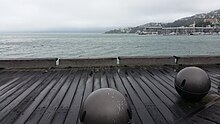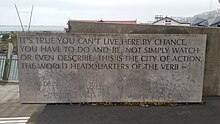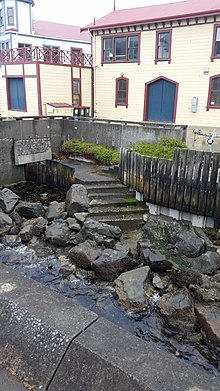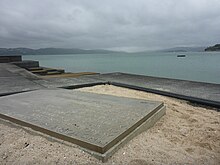Wellington Writers Walk

The Wellington Writers Walk is made up of a series of 23 quotations from New Zealand writers, including poets, novelists, and playwrights. The quotations are placed along the Wellington waterfront, from Kumutoto stream to Oriental Bay, in the form of contemporary concrete plaques or inlaid metal text on wooden 'benchmarks'.[1][2][3][4] They were designed by Catherine Griffiths and Fiona Christeller and installed to honour and celebrate the lives and works of these well-known writers, all of whom had (or have) some connection to Wellington.
History
The Wellington Writers Walk began as a project of the Wellington Branch of the New Zealand Society of Authors (PEN NZ Inc.) Te Puni Kaituhi o Aotearoa under the inaugural committee of Eirlys Hunter (convenor), Robin Fleming, Dame Fiona Kidman, Barbara Murison, Ann Packer, Susan Pearce, Judy Siers and Joy Tonks.[5] The committee later comprised Rosemary Wildblood (convenor), Robyn Cooper, Sarah Gaitanos, Michael Keith and Barbara Murison.[6]

The first series of 11 concrete plaques were designed by internationally renowned typographer Catherine Griffiths,[7][8] with each plaque having an individual sponsor. The Writers Walk was opened during New Zealand Post Writers and Readers Week, part of the International Festival of the Arts, on 11 March 2002.[9][10] Stage Two of the Walk was launched on 8 May 2004.[11] Catherine Griffiths was awarded the Terry Stringer Award at the BEST Design Awards in 2002 for her work on the sculptures.[12]
The quotations for Jack Lasenby, Joy Cowley, James McNeish and Elizabeth Knox were unveiled by the then patron, Governor-General Sir Jerry Mateparae,[13] in a ceremony on the waterfront on 20 March 2013.[14][15] These were designed by award-winning Wellington architect Fiona Christeller.[16]
The Writers Walk attracts a lot of attention from locals[17][18] as well as visitors, tourists, bloggers and photographers,[19][20][21] and is also a popular expedition for school groups.[22]
Past Patrons of the Wellington Writers Walk have included Dame Silvia Cartwright, Sir Anand Satyanand, Sir Jerry Mateparae and Lady Janine Mateparae and Dame Patsy Reddy.
Events
In 2008, the Wellington Writers Walk committee held the Wellington Sonnet Competition, sponsored by New Zealand Post, which attracted over 200 entries. The competition was judged by Harry Ricketts and won by Michele Amas, with Saradha Koirala and Richard Reeve in second and third place respectively.[23]
In 2012, New Zealand was Guest of Honour at the Frankfurt Book Fair, and the Wellington Writers Walk played a starring role, with large decals of the quotations appearing alongside the River Main in Frankfurt.[24][25] It was launched there in September 2012 by New Zealand writers Hamish Clayton and Tina Makereti, both in residence at Frankfurt's Weltkulturen Museum.[26]
The Writers Walk featured in a 2015 Spectrum documentary when presenter Jack Perkins explored part of the walk with Rosemary Wildblood, Barbara Murison and Philippa Werry.[27]
In 2017, a project for the Wai-Te-Ata Press at Victoria University of Wellington, called the Literary Atlas of Wellington, was undertaken to create an augmented reality mobile application based on the Wellington Writers Walk.[28][29]
List
| Plaque | Writer | Dates | Quotation | Source | Location |
|---|---|---|---|---|---|

|
Elizabeth Knox | b. 1959 | The evening light concentrated, till the city and the
topped-up trembling horizon beyond Pencarrow Head would begin to look like a seaport in someone's lost paradise. |
From 'Provenance'
in The Love School (Victoria University Press, 2008) |
https://www.google.com/maps/place/Wellington+Writer's+Walk+%231/@-41.2828242,174.7782602,18z/data=!3m1!4b1!4m5!3m4!1s0x6d38af4843440b07:0xe2c62ecfc5693f00!8m2!3d-41.2828256!4d174.779034 |

|
Eileen Duggan | 1894-1972 | My quiet morning hill
Stands like an altar drawn Whereon hushed hands shall lay The shining pyx of dawn. With penitence and stir, And drowsy flurry by, The wind, a shamefaced serving-boy Comes running up the sky. |
'The Acolyte'
in Selected Poems: Eileen Duggan, ed. Peter Whiteford (Victoria University Press, 1994) |
https://www.google.com/maps/place/Wellington+Writer's+Walk+%232/@-41.2839725,174.7780358,18z/data=!3m1!4b1!4m5!3m4!1s0x6d38afe4ff57ea8d:0x6733410e451a82c5!8m2!3d-41.2839725!4d174.7791301 |

|
Denis Glover | 1912-1980 | The harbour is an ironing board;
Flat iron tugs dash smoothing toward Any shirt of a ship, any pillowslip Of a freighter they decree Must be ironed flat as washing from the sea. |
From 'Wellington Harbour is a Laundry'
in Come High Water (Dunmore Press, 1977) |
https://www.google.com/maps/place/Wellington+Writer's+Walk+%233/@-41.2872816,174.7772092,17z/data=!3m1!4b1!4m5!3m4!1s0x6d38afb69d22f1ef:0x8ee95667be0ad78f!8m2!3d-41.2872857!4d174.7793979 |

|
Michael King | 1945-2004 | I baited my line, watched it sink, and waited with
exquisite anticipation for the pecking of mullet, the sucking of trevally, or - best of all - the sudden pull of kahawai or kingfish. |
From Being Pakeha Now
(Penguin Books, 1999) |
https://www.google.com/maps/search/Wellington+Writer's+Walk+%234/@-41.2872735,174.7772092,17z/data=!3m1!4b1 |

|
Louis Johnson | 1924-1988 | From Brooklyn hill, ours is a doll-size city
A formal structure of handpicked squares and bricks Apprehensible as a child’s construction Signifying community. |
From 'Last View of Wellington'
in Fires and Patterns (The Jacaranda Press, 1975) |
https://www.google.com/maps/place/Wellington+Writer's+Walk+%235/@-41.2879898,174.7772166,17z/data=!3m1!4b1!4m5!3m4!1s0x6d38af241aa73ceb:0x203f65349b01e111!8m2!3d-41.2879939!4d174.7794053 |

|
Pat Lawlor | 1893-
1979 |
And now, as I grow in years,
I feel at times like an old violin played on by a master hand. You, dear city, are the maestro drawing the bow over the sensibilities of my mind, echoing the music of my days. |
From Old Wellington Days
(Whitcombe & Tombs, 1959) |
https://www.google.com/maps/search/Wellington+Writer's+Walk+%236/@-41.2879817,174.7772166,17z/data=!3m1!4b1 |

|
Lauris Edmond | 1924-2000 | It’s true you can’t live here by chance,
you have to do and be, not simply watch or even describe. This is the city of action, the world headquarters of the verb – |
From 'The Active Voice'
in Scenes from a Small City (Daphne Brasell Associates Press, 1994) |
https://www.google.com/maps/search/Wellington+Writer's+Walk+%237/@-41.2879736,174.7772166,17z/data=!3m1!4b1 |

|
Vincent O'Sullivan | b. 1937 | Then it’s Wellington we’re coming to!
It’s time, she says, it’s time surely for us to change lanes, change tongues, they speak so differently down here. |
From 'Driving South with Lucy to the Big Blue Hills'
in Seeing You Asked (Victoria University Press, 1998) |
https://www.google.com/maps/@-41.2888522,174.7787781,3a,90y,296.49h,86.07t/data=!3m6!1e1!3m4!1sJJEEaRy_gnvrLbvg9ycqKQ!2e0!7i13312!8i6656 |

|
Maurice Gee | b. 1931 | Then out of the tunnel and
Wellington burst like a bomb. It opened like a flower, was lit up like a room, explained itself exactly, became the capital. |
From Going West
(Faber and Faber, 1992) |
https://www.google.com/maps/place/Wellington+Writer's+Walk+%239/@-41.2876527,174.7747313,16z/data=!4m5!3m4!1s0x6d38af14faec583b:0x8f95516b4fc31200!8m2!3d-41.288232!4d174.7795063 |

|
Patricia Grace | b. 1937 | I love this city, the hills, the harbour, the
wind that blasts through it. I love the life and pulse and activity, and the warm decrepitude ... there’s always an edge here that one must walk which is sharp and precarious, requiring vigilance. |
From Cousins
(Penguin Books, 1992) |
https://www.google.com/maps/place/Wellington+Writer's+Walk+%2310/@-41.2886204,174.7777457,17z/data=!3m1!4b1!4m5!3m4!1s0x6d38afe3b907f2ed:0xa3f45f618b0a8b35!8m2!3d-41.2886245!4d174.7799344 |

|
Jack Lasenby | 1931-2019 | I want to live among people who believe in truth and
freedom...I want to discuss ideas... I want books... |
From The Conjurer
(Oxford University Press, 1992) |
https://www.google.com/maps/place/Wellington+Writer's+Walk+%2311/@-41.2896156,174.7777925,17z/data=!3m1!4b1!4m5!3m4!1s0x0:0xafaefeb47a23c55b!8m2!3d-41.2896197!4d174.7799812 |

|
Bill Manhire | b. 1946 | I live at the edge
of the universe, like everybody else. |
From 'Milky Way Bar'
in Milky Way Bar (Victoria University Press, 1991) |
https://www.google.com/maps/@-41.2896284,174.7806273,3a,15y,243.93h,61.7t/data=!3m7!1e1!3m5!1sn_NVtqibXKt9jVTW1YSDcQ!2e0!6shttps:%2F%2Fstreetviewpixels-pa.googleapis.com%2Fv1%2Fthumbnail%3Fpanoid%3Dn_NVtqibXKt9jVTW1YSDcQ%26cb_client%3Dsearch.revgeo_and_fetch.gps%26w%3D96%26h%3D64%26yaw%3D175.58965%26pitch%3D0%26thumbfov%3D100!7i13312!8i6656 |

|
Sam Hunt | b. 1946 | Tall buildings no bigger than blocks on the floor,
Wellington afloat on the harbour haze ... You think of how most men spend their days In offices as cramped as elevators – |
From 'Letter to Jerusalem 2'
in Collected Poems 1963 - 1980 (Penguin Books, 1980) |
No good quality Google Maps link. Imagine this artwork is Just to the left, across the "diving board" from the previous (Bill Manhire) link. |

|
Bruce Mason | 1921-1982 | I ask that not only my city,
but all, give themselves to the essence of our cult – the ritual assembly of an interested coterie in a space where magic can be made and miracles occur. |
From Theatre in 1981: Omens and Portents
unpublished ms, Bruce Mason papers, JC Beaglehole Room, Victoria University of Wellington |
In front of Circa Theatre, near Te Papa |

|
Alistair Te Ariki Campbell | 1925-2009 | Blue rain from a clear sky.
Our world a cube of sunlight – but to the south the violet admonition of thunder. |
From 'Blue Rain'
in The Dark Lord of Savaiki: Collected Poems (Hazard Press, 2003) |
https://www.google.com/maps/@-41.289743,174.7806881,3a,52.3y,157.13h,79.78t/data=!3m6!1e1!3m4!1sMLIVNkRpOk9ecEpXdW0Mxg!2e0!7i13312!8i6656 |
 |
Robin Hyde | 1906-1939 | Yet I think, having used my words as the kings used gold,
Ere we came by the rustling jest of the paper kings, I who am overbold will be steadily bold, In the counted tale of things. |
From 'Words'
in Young Knowledge: The Poems of Robin Hyde, ed. Michele Leggott (Auckland University Press, 2003) |
https://www.google.com/maps/@-41.2896105,174.7814115,3a,15.1y,188.51h,86.62t/data=!3m6!1e1!3m4!1sFQEnTAbixV7aMAv10jKy8Q!2e0!7i13312!8i6656 |
 |
James K. Baxter[30] | 1926-1972 | I saw the Maori Jesus
walking on Wellington Harbour. He wore blue dungarees. His beard and hair were long. His breath smelt of mussels and paraoa. When he smiled it looked like the dawn. |
From 'The Maori Jesus'
in Collected Poems of James K Baxter, ed. J E Weir (Oxford University Press, 2003) |
https://www.google.com/maps/@-41.2894922,174.7825234,3a,40.9y,216.75h,96.06t/data=!3m6!1e1!3m4!1sE78bVHG9-vzIABFIbMRo-g!2e0!7i13312!8i6656 |

|
Katherine Mansfield[31] | 1888-1923 | Their heads bent, their
legs just touching, they stride like one eager person through the town, down the asphalt zigzag where the fennel grows wild ... the wind is so strong that they have to fight their way through it, rocking like two old drunkards. |
From 'The Wind Blows'
in Bliss and Other Stories (Penguin Books, 2001) |
https://www.google.com/maps/place/Wellington+Writer's+Walk+%2318/@-41.2886123,174.7777457,17z/data=!4m5!3m4!1s0x6d38af3df6c6e91d:0xbcbc0b2e372e1649!8m2!3d-41.2893614!4d174.7830566 |

|
Joy Cowley | b. 1936 | Light dances on hills and office windows
and shakes its skirts over the harbour in a wild fandango that attracts the pale moths of yachts in droves |
From the poem 'After the Southerly'
in Writing from the Heart (Storylines, 2010) |
|

|
James McNeish | 1931-2016 | A ruffian wind is bliss, a blind man's
comfort station. When I get tired of walking around it, I can always lean against it. |
From The Crime of Huey Dunstan
(Random House, 2010) |
https://www.google.com/maps/place/Wellington+Writer's+Walk+%2320/@-41.2896075,174.7777925,17z/data=!4m5!3m4!1s0x6d38af6b529c7cbd:0xf231f95664c08acd!8m2!3d-41.2905541!4d174.7839984
https://www.google.com/maps/@-41.2905919,174.7839315,3a,16.9y,58.69h,72.06t/data=!3m6!1e1!3m4!1sNIgJtDkQm_lkuShXQMfkSg!2e0!7i13312!8i6656 (Image - look closely) |

|
Marilyn Duckworth | b. 1935 | Then with the coming of darkness the
bay opened up beneath us, like a shell splashed with beads of light. |
From A Barbarous Tongue
(Hutchinson, 1963) |
https://www.google.com/maps/@-41.2905718,174.7842898,3a,42.8y,2.21h,84.91t/data=!3m6!1e1!3m4!1sxfvrnXGVfFZWE-yAA0KPaA!2e0!7i13312!8i6656 |

|
Fiona Kidman[32] | b. 1940 | This town of ours kind of flattened
across the creases of an imaginary map a touch of parchment surrealism here no wonder the lights are wavering all over the place tonight not a straight town at all |
From 'Speaking with my Grandmothers'
in Writing Wellington, ed. Roger Robinson (Victoria University Press, 1999) |
https://www.google.com/maps/place/Wellington+Writer's+Walk+%2322/@-41.2900549,174.7877836,17z/data=!3m1!4b1!4m5!3m4!1s0x6d38afe8d6844ea9:0xaad9489e13827508!8m2!3d-41.290059!4d174.7899723 |

|
Barbara Anderson | 1926-2013 | Everything about it was
good. The tugging wind trapped and cornered by buildings, steep short cuts bordered by Garden Escapes, precipitous gullies where throttling green creepers blanketed the trees beneath. |
From 'The Girls'
in I Think We Should Go into the Jungle (Victoria University Press, 1989) |
https://www.google.com/maps/place/Wellington+Writer's+Walk+%2323/@-41.2886026,174.7974058,17z/data=!4m5!3m4!1s0x6d38af5987632455:0xb2bd5bb1d154048d!8m2!3d-41.2886026!4d174.7995945 |
References
- ^ McCrystal, John (8 May 2017). "Wellington Waterfront: where writers' words are cast". AA Traveller. Retrieved 17 December 2019.
- ^ "Wellington Writers Walk". Collabcubed. 17 April 2013. Retrieved 17 December 2019.
- ^ "Wellington Writers Walk". STQRY. Retrieved 17 December 2019.
- ^ "Wellington Writers Walk". NZ Places: explore the cultural landscape. Retrieved 17 December 2019.
- ^ Wellington Writers Walk. Wellington: Wellington branch of the New Zealand Society of Authors (PEN) Inc. 2002. p. 28.
- ^ Wellington Writers Walk: a project of the Wellington Branch of the New Zealand Society of Authors (PEN) Inc. Wellington Writers Walk committee. 2009.
- ^ "typography in the landscape". studio catherine griffiths. Retrieved 17 December 2019.
- ^ Sluiter, Matthijs (30 March 2015). "Wellington Writers Walk". Fonts in Use. Retrieved 17 December 2019.
- ^ ""Writers' words writ large in concrete for waterfront", The Evening Post, February 2002". Unity Books. 28 March 2019. Retrieved 17 December 2019.
- ^ "Writers Walk, 11th March 2002". Unity Books. 20 February 2019. Retrieved 17 December 2019.
- ^ "Wellington Writers Walk, Stage Two, 8th May 2004". Unity Books. 10 September 2018. Retrieved 17 December 2019.
- ^ "Catherine Griffiths awarded Terry Stringer Award, 12th September 2002". Unity Books. 24 August 2018. Retrieved 17 December 2019.
- ^ Mateparae, Sir Jerry (21 March 2019). "Wellington Writers Walk Quotation Unveiling". Office of the Governor-General. Retrieved 17 December 2019.
- ^ Gaitanos, Sarah (21 March 2013). "Wellington Writers Walk". Sarah Gaitanos: writer, oral historian. Retrieved 17 December 2019.
- ^ "More ground to cover on Writers Walk". Stuff. 14 April 2014. Retrieved 24 December 2019.
- ^ "Wellington Writer's Walk | architecture FCA". 13 January 2015. Archived from the original on 13 January 2015. Retrieved 28 March 2023.
- ^ Doyle, Judith (1 May 2018). "The Writers Walk". Oriental Bay Residents Association.
- ^ "#710 ... Sleeping Writer". Wellington Daily Photo. 15 May 2009. Retrieved 17 December 2019.
- ^ "Out There in Wellington: Words Along the Water Front". WildBay. 15 August 2012. Retrieved 17 December 2019.
- ^ "Writers Walk Wellington". Jason Mann Photography. 30 October 2015. Retrieved 17 December 2019.
- ^ "Wellington Writers Walk". Striding out. 4 February 2013. Retrieved 17 December 2019.
- ^ "Urban Safari: Writers Walk". Avalon Primary School. 6 March 2015. Retrieved 17 December 2019.
- ^ Wellington Sonnets by prize-winning entrants in the Wellington Sonnet Competition 2008. Paekakariki: Earl of Seacliff Art Workshop. 2008.
- ^ "Wellington Writers Walk goes global". Manatu Taonga: Ministry for Culture and Heritage. 25 September 2012. Retrieved 17 December 2019.
- ^ Handal, Nathalie (13 April 2016). "The City and the Writer: In Wellington, NZ with Chris Price". Words without Borders. Retrieved 5 January 2020.
- ^ "New Zealand launches writers' walk in Frankfurt". Manatu Taonga: Ministry for Culture and Heritage. 25 September 2012. Retrieved 17 December 2019.
- ^ "Sculptured Words". RNZ. 10 May 2015. Retrieved 17 December 2019.
- ^ "FHSS SHOWCASE PRESENTATION". Literary Atlas Development Blog. 8 October 2017. Retrieved 17 December 2019.
- ^ "Literary Atlas of Wellington". LitAtlas. Retrieved 17 December 2019.
- ^ Howells, Pip (22 October 2014). "James K. Baxter Writers' Walk sculpture". Te Ara: The Encyclopedia of New Zealand. Retrieved 17 December 2019.
- ^ "Wellington Writers' Walk Plaque". Katherine Mansfield Society. Retrieved 17 December 2019.
- ^ "Wellington Writers Walk sculpture". Fiona Kidman - writer. Retrieved 17 December 2019.
External links
- Wellington Writers Walk website
